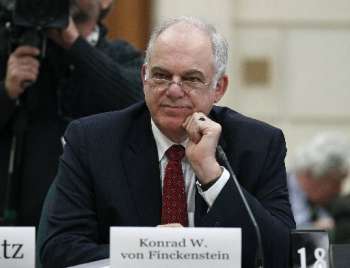
Finckenstein at Thursday's hearing. Turn me over when I'm done on one side.
Canadian Radio-television and Telecommunications Commission chairman Konrad von Finckenstein appeared before a Commons committee last Thursday to answer questions regarding the growing scandal of so-called “usage-based billing (UBB).” The Commission’s decision to enforce this pricing scheme, ending unlimited broadband service in Canada, has created major headaches for the Conservative government of Prime Minister Stephen Harper.
Seasoned political observers were shocked when Industry Minister Tony Clement earlier tweeted his support for overturning the CRTC decision. Thursday’s hearing at the Standing Committee on Industry, Science and Technology also suggested the decision was made without any prior consultation with von Finckenstein, who appeared to be learning most of the details of the Clement’s decision at the hearing itself or in the morning newspapers.
Facing a grilling from members from just about every major political party in Canada, from the Liberals to the Bloc Quebecois, von Finckenstein only managed to add fuel to the fire, blaming “heavy users” for forcing the end of unlimited usage plans, all to protect what he called “innocent users.” He also blamed online video services like Netflix for forcing new pricing policies on Canadian consumers, who were increasingly using their broadband connections for more than just “e-mail and Facebook.”
At times exasperated, the chairman seemed to rely on industry talking points to address concerns with MP’s in attendance, occasionally without fully understanding their meaning.
At one point, he insisted Internet Protocol TV (IPTV), was never delivered over the Internet. At another, he claimed that providers would certainly use all of the funds collected from new, higher-priced broadband plans to rebuild their networks, asking rhetorically, “how else would they use that money?”
The head of the agency that is tasked with protecting the interests of Canadian consumers regularly compared the Internet to a power, gas, or water utility, which he said justified usage pricing. But von Finckenstein ignored landline telephone service, which is most related to broadband — a service moving towards flat rate pricing. Instead, he relied on cell phone pricing, which caused several reporters to cringe, as they reflected on newly-introduced flat-rate calling plans among new wireless competitors.
At this point a reporter for the Globe & Mail bemused with all of the utility comparisons tweeted: “Main difference is I can’t watch movies on my furnace.”
Watch the entire 90-minute hearing by clicking here and choosing the English version, which provides simultaneous translation as the hearing moves back and forth from French to English.
The CRTC’s decision to ignore hundreds of thousands of petition signers across Canada while quickly acceding to Bell’s request for a 60-day temporary delay in implementing the pricing scheme brought an angry response from Openmedia.ca, a pro-consumer group highly critical of UBB.
“The CRTC’s stubbornness in the face of a mass public outcry demonstrates the strength of the Big Telecom lobby’s influence,” said founder and national coordinator Steve Anderson . “While government officials have recognized the need to protect citizens’ communications interests, the CRTC has made it clear that their priorities lie elsewhere. Now is the time for citizens to demonstrate that they, rather than incumbent ISPs, are the real stakeholders.”
Some media observers and consumer groups are also scoffing at the government’s suggestion the CRTC should be allowed to review its own, earlier decision, claiming it is a virtual certainty the regulator will find their original decision was the correct one.
In fact, von Finckenstein’s relentless defense of usage-based pricing, even in light of recent political realities, suggest the Commission’s authority could be swept aside to keep the matter from becoming an issue in future elections.
“I would like to reiterate the Commission’s view that usage-based billing is a legitimate principle for pricing Internet services,” the chairman told members attending the hearing. “We are convinced that Internet services are no different than other public utilities, and the vast majority of Internet users should not be asked to subsidize a small minority of heavy users. For us, it is a question of fundamental fairness. Let me restate: ordinary users should not be forced to subsidize heavy users.”
The CRTC also claims the UBB policy will only impact residential customers — business accounts are exempt. But several MPs questioned that statement, suggesting home-based businesses, farmers and other entrepreneurs would face Internet Overcharging schemes.
Canada’s Liberal Party is using the occasion to embarrass the Tories’ handling of what they’ve called an Internet fiasco. Liberal’s industry critic, Marc Garneau, used some of his seven minutes of question time to ask whether the CRTC first heard of the Harper government’s stance on UBB through social media network Twitter.

Quotes from the CRTC Chairman; Image by Vojtěch Sedlák & Openmedia.ca
 Despite claims from the Canadian Radio-television and Telecommunications Commission that it is reviewing its recent decision about usage-based billing on its own accord, the telecommunications regulator has bowed under government pressure to begin an immediate review of the Internet billing practice.
Despite claims from the Canadian Radio-television and Telecommunications Commission that it is reviewing its recent decision about usage-based billing on its own accord, the telecommunications regulator has bowed under government pressure to begin an immediate review of the Internet billing practice.

 Subscribe
Subscribe![iphone-line-apple [Courtesy: goodrob13]](https://stopthecap.com/wp-content/uploads/2011/02/iphone-line-apple-300x225.jpg)



